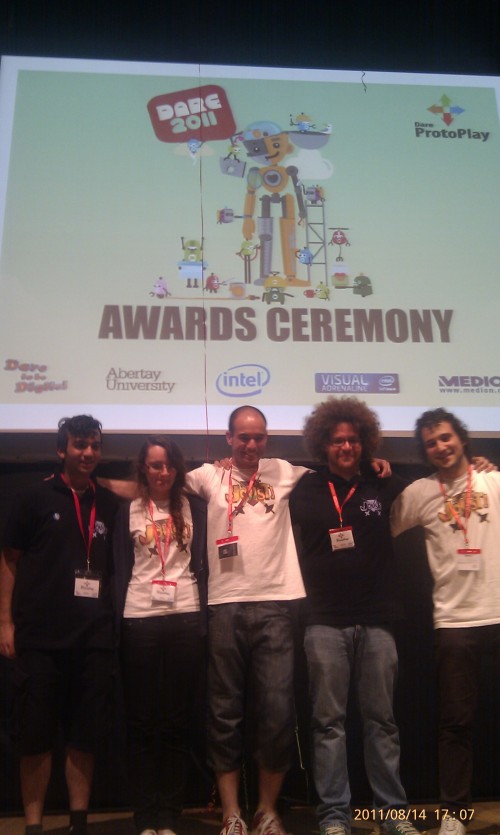 Skrevet av Charles Butler, høgskolelektor ved NITH. En fortsettelse av «Why do games need defending» og «What makes games different?«
Skrevet av Charles Butler, høgskolelektor ved NITH. En fortsettelse av «Why do games need defending» og «What makes games different?«
In addition to being a complex medium of expression, games actually offer a number of benefits, many of which aren’t as easily replicated by other forms of media. Here are a number of commonly cited beneficial effects of playing video games:
- Making surgeons significantly faster and less prone to error
- Helping us get into shape
- Teaching us to play an instrument
- Helping us learn practically anything
- Increasing our reaction times, making us less prone to distraction, making us better drivers, and increasing our ability to multitask
These certainly illustrate how people’s lives can be enriched though gaming, but because these have been well covered in the press, I want to focus on a different type of benefit, interpersonal development. Developing social skills through gaming seems to get very little attention (possibly because of the stereotypical concepts that people often attach to gamers), but I consider it the most unique and influential effect that games have to offer.
Despite common gamer stereotypes, no other form of media is as inherently social as games. Of course, it’s certainly possible to play a game entirely by yourself. However, as Raph Koster points out, single-player games are a bit of an anomaly, largely due to the early technical limitations of the industry and the personality types most commonly found in game developers. When the entire history of games in considered, very few of them seem to fit the single player mold. Today, more and more video games are including multiplayer support, and even if there isn’t an in-game option, gamers find ways to play together (though when we consider achievements and leaderboards, there are almost always options).
Sports may be the most obvious example of the historical tendency for gamers to gather together. It confuses me that people can see sports as positive but video games as negative. Thus far, sports have had the clear advantage of encouraging people to stay physically fit (though the detrimental health effects are largely ignored), but some games are now helping people stay fit as well. However, anyone who sees sports as a positive would likely agree that there are benefits to be gained from sports far beyond the physical.
Almost every sport (even non-team sports, such as golf, sprinting, or ski-jumping) has a social aspect. Players work with other people to improve. Teams have captains and coaches as well as players of various ages and experience levels. This helps everyone involved learn to be more effective, both as leaders and as followers. Teamwork is a central tenet. Goals are set, and players strive to meet them. Failure occurs and is studied and learned from. Strategies are developed, tested, and iterated. Improvement occurs, leading to increased confidence and self-efficacy. Friends are made, and working together toward a common goal strengthens those bonds. All of these aspects are a part of both sports and games. It makes little difference if the activity takes place on a field, on a tabletop, or on a screen. There are few circumstances outside of sports and games where a young person can be exposed to such a variety of growth opportunities.
However, accessibility is a major drawback to sports. While most people can play sports in their back yards or at their local park, things are far more limited when considering organized sports (where most of the social opportunities reside). Team size is often restricted, and there is a limit to the number of different sports that a given area can support. There are age-brackets that players must fit into, and positions are available only to those of sufficient physical ability. In contrast, the opportunities are almost limitless with video games. Players can choose from huge variety of games which can be as solitary or as social as the participants prefer. A gamer is free to play solo, with a small group of friends, or in an organization filled with hundreds of people.
What other circumstance allows a person to so easily join, manage, or form a social group? When considering a similar endeavor in real-life, there are so many variables that lie (to varying degrees) outside of a person’s control: age, physical attributes, financial situation, experience, etc. However, within a game world, anyone can grow and develop their abilities at their own pace, largely unfettered by external factors. In doing so, they not only develop «in-game» abilities but real competencies such as social skills, teamwork, and leadership. The opportunities that we encounter in the real world are filtered through layer upon layer of expectations stemming from many factors that are largely out of our control. I wish everyone could see the potential of games to encourage growth opportunities without all of the additional baggage that comes along with real life. Admittedly, this is likely possible in other forms, but games act as a natural incubator for this type of environment. Instead of being a theoretical possibility, it is happening at this very second on thousands of game servers around the world.
Yes, I’ve actually seen this happen…
To give a couple of anecdotal experiences from my gaming history, I’ll refer to two instances that occurred within gaming organizations I have been a part of over the years. In one instance, a young person had joined the organization (again, someone in his early-mid teens), and he didn’t have much experience interacting with a diverse group of people. He had seemingly been raised in a very racist and xenophobic environment, but he gradually adjusted, at least enough to remain in the group. After some months with the group, it came up in conversation that the group’s leader, who he had come to know and respect, was of a different race. This member had been taught from birth that this race was vastly inferior. Just imagine how much of a shock that must have been to his entire view of the world. I am confident that this incident set him on a path to becoming a much better person.
The next experience involved a player who took over leadership of the organization when he was quite young, only fourteen or fifteen. No one knew quite how old he was initially since everyone knew each other only by their in-game persona. Sharing real-life information was entirely optional and fairly rare. Over the next few years, he turned into one of the most adept leaders that I’ve ever known in-game, successfully leading over one hundred people who were likely twice his age on average and keeping the group in top competitive shape for years. In what other environment could a fourteen year old have accomplished this? And how else could a person so young find himself in a position to gain such a wealth of growth and experience? Imagine being eighteen and job hunting for the first time in your life. Now imagine being able to truthfully claim four years of experience closely managing over one hundred volunteers in a highly stressful, competitive, and successful organization? (Of course, the interviewer might scoff at idea of useful experience originating in a game, but that’s a big part of the reason games need defending.)
The cooperative and pseudonymous environment present in games allows us to bypass many of the social barriers present in the real world. Where else can respect and friendship develop, not in spite the presence of years of bias and prejudice, but in complete ignorance of it? Where else can that bias and prejudice be crushed so instantly? Where else can an under privileged fifteen-year-old from a small town and an affluent fifty-year-old professional work together and learn from one another as peers, striving for the same goals and overcoming the same obstacles? Despite offer unparalleled opportunity for growth and development, games remain in constant need of defense. I hope to encourage some of you to join in, because games are absolutely worth defending.








